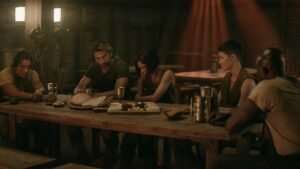In the strange and wonderful little world of horror flicks, director Adam Wingard and writer Simon Barrett are slowly carving out a place for themselves as masters of the craft.
They had each worked separately in the low-to-no budget genre world for years before finding each other just as the 2010s arrived. Together, they’ve formed a two-headed filmmaking team so perfect that it’s as if Satan himself put them on the world purely to give horror movies a much needed kick in the tush. They began their partnership on A Horrible Way To Die, a chilly serial killer movie stripped of all glamour and grace to cut right into the heart of madness. Then they made the brilliant and darkly comic home invasion horror film You’re Next, which premiered to standing ovations at TIFF’s Midnight Madness program in 2011, but didn’t make it to screens until last year when it promptly became a cult classic. In between, they also created the V/H/S series, which quickly became the most popular anthology horror series of its era.
Now Wingard and Barrett have returned with The Guest, a film that also premiered at Midnight Madness, yet seems to signal the duo starting to shift out of the horror genre. The tale of a creepily sweet army vet (Dan Stevens) who welcomes himself into the family home of a fallen soldier only to gradually reveal a dark past, plays as horror and climaxes in a high school haunted house, yet also has other intentions in mind. It’s an homage to those 80s genre benders that combined horror, thriller, and action movie elements into one big rollicking ride of entertainment. The slick n’ sick flick even boasts a vintage synth soundtrack as a cherry on top. Wingard and Barrett have delivered a movie just as witty, knowing, and thrilling as You’re Next, only with a few sequences that show they’d be just as at home delivering an action movie as they’ve proven to be with horror.
It’s sure to be another beloved title for genre fans and already seems to have given the boys a leg up in Hollywood as they just signed on to make their biggest project to date: an American remake of Jee-Woon Kim’s vicious masterpiece I Saw The Devil. With any other filmmakers in charge of the remake, I’d be convinced it would fail. With Wingard and Barrett coming off of The Guest, it’s all but guaranteed to succeed. Unfortunately, I wasn’t able to grill them about their upcoming movie when they sat down for an interview with CGM during this year’s Toronto International Film Festival since the project hadn’t been announced yet. However, I did chat with the lively duo about The Guest, their working relationship, their failed film in South Korea, and a number of other topics. Enjoy.
So it must be nice to premiere The Guest at TIFF knowing it’s coming out in a few weeks as opposed to last time.
Adam Wingard: Well, yeah (laughs). But regardless of that, it’s always nice to have a film playing for that midnight audience. They fill that house with the most ravenous film fans. We can’t wait to see it play for them.
Simon Barrett: It is nice that the film is coming out soon though, especially after You’re Next taking two years.
Yeah, I’m sure my frustration is nothing compared to what you went through, but I made the mistake of skipping it that year because it had a distributor and I thought I’d see it soon. I still curse myself for that mistake.
Simon Barrett: A lot of people did. The funny thing was that at Fantastic Fest, which was our only other festival screening, they cancelled all of our screenings but one, which was opposite The Fantastic Debates, which is a big event there. So everyone was like, “I’ll just see your movie when Lion’s Gate puts it out.” And I kept saying, “Whew! I don’t know. You might want to skip Dominic Monaghan fighting Elijah Wood.”
Adam Wingard: (Laughs)
CGM: So where did The Guest begin for you two? It feels like it began as an homage to 80s genre movies, but I’m not sure if you guys think that way at the start of a project.
Simon Barrett: Oh yeah. Those are the movies that we were watching growing up. The first movies that I really studied simply because I was old enough to know what movies were, were the genre movies of the 80s. Those are the movies that I watched again and again and again. For both of us those are the movies that made us want to make movies. (To AW) I’ve actually never asked you this. I’ve wanted to make movies for as long as I can remember. Are you the same way?
Adam Wingard: Oh yeah, I remember having conversations with my friends in the fourth or fifth grade saying that we should start making movies. The only problem was that none of us had a camera. Being out in Alabama, you just feel so removed from the whole filmmaking system. For years I thought that wanting to make movies just didn’t make any sense. So for years I wanted to be a comic book artist. That’s initially what I did, but ultimately that just wasn’t for me. Then in about the sixth or seventh grade we got a camera and once I realized that filmmaking is just a matter of playing with the camera, that’s what I locked into.
Simon Barrett: Yeah, our public library had VHS camera. Then my family gave me a VHS camcorder for my 13th birthday. Adam ended up using it to shoot a good portion of the first V/H/S, which the camera did not survive. I still have it, it just doesn’t work anymore.
Adam Wingard: You know, I used to carpool with a family in Alabama and their son was in the film program in the University Of Alabama. I remember his mother showed us one of his projects one day. He took one of the chase scenes from First Blood and put some song over it, which made it seem like Brian Dennehy was singing whenever he was talking into his walky-talky. I remember that was very inspirational to me because that was something I could do. So my initial forte into filmmaking was taking scenes from movies and adding music to them. I remember I added the Mortal Kombat soundtrack to that chase scene in Ghost In The Shell. Actually, I could probably synch that up still because I did it so many times. But I remember how important that was to seeing how a piece of music can change a scene.
Simon Barrett: How did you do that, with two different VCRs?
Adam Wingard: Actually, at the time I’d just do it live. I’d just push play on the tape player and the VCR.
Simon Barrett: Oh yeah, I did that. My first short film that I shot on 16mm was like that. It was silent and I could never afford sound. All I had was a VHS transfer that I’d play with a record. I could never figure out how to get sound onto that VHS tape.
You guys are good at this. You don’t even need me.
(Both laugh)
Simon Barrett: Yeah, we’ve done enough of these now that we’re just answering our own questions.
Adam Wingard: We’re in the middle of a big press tour, so we’ve discussed the origins of Dan Stevens and the music and the influences so many times. Stop us if we get too far off track.
Simon Barrett: I think we just give better answers to questions we haven’t been asked a thousand times before, so we just do that sometimes. Honestly, I’d never asked Adam that.
Ok. I can work with that. We can skip all those things.
Simon Barrett: (laughs) It’s fine. You’re the only one we’ve ever put on the spot.
Adam Wingard: We are in the final laps here.
No prob. Happy to change things up. Ok, so you’re first movie A Horrible Way To Die was tonally completely different from You’re Next and The Guest. But those two are quite similar to each other in their knowing humor and genre games. Is that the direction you guys see yourselves continuing to follow?
Simon Barrett: Well, the answer to that is pretty complicated. After we did A Horrible Way To Die, that movie had its fans but really didn’t entertain people as much as we’d hoped. So there really was a recalibration in terms of the types of films we wanted to make. That said, I’m a big believer that each story has a style that’s appropriate. That film had the tone that was appropriate. It’s just that The Guest is a really fun story and I think it turned out even more fun than we had anticipated.
Adam Wingard: Yeah, I think You’re Next and The Guest was really a result of us, now that we had more resources, really reconnecting with what got us into filmmaking to begin with. I felt like we were compelled to pay homage to the masters that brought us into this without making references or following them too closely. I think we’ll probably go back and do some darker stuff down the line, but as of right now it was really about revisiting our roots and reflecting them. Also, if we’d kept on that path of doing dark, character driven films like A Horrible Way To Die, there’s a danger that people would only see us that way. There was an element of us wanting to show people that we can do a lot of different things. That’s a complicated and long process, but I think we’re getting there. Even with The Guest, which is more performance driven, that’s already opened up so many new doors just because it shows that we can do a certain thing that other people can’t do.
Simon Barrett: Adam and I always try to think of the viewer first and figure out who is the audience. That gives us a certain objectivity in shaping our scripts and cutting things down in the editing room. But we couldn’t make The Guest with the resources we had to make A Horrible Way To Die. As your resources increase, you change your style to accommodate that. These are the movies that we always wanted to make. We just couldn’t before.
I’m curious about how you two work together. It seems very fluid, even though you don’t share credits. So are you always around each other sharing ideas or is there a point where you each go off on your own and come back?
Adam Wingard: I think the overall plan that seems to work is that we like to agree initially on the type of film we want to make. That’s evolved as we’ve gone along. Because with A Horrible Way To Die and You’re Next, the general story idea came from, “what could we get made.” A serial killer movie and a home invasion movie seemed like projects that we could get made and then once that was established, Simon went off and wrote. I like to give Simon total space for that. I want him to work fully as a writer just as he wants me to work uninhibited as a director. We still give each other notes, but when he’s doing his draft, I stay out of it. Similarly, when I’m editing, Simon and the producers give that respect. It’s only when we have something concrete that we collaborate fully.
I was fascinated when I heard the two of you almost made a movie in South Korea, because they make some of the greatest genre movies in the world right now. So how did that come about and what happened?
Adam Wingard: Well, that’s what we thought too. But we realized that maybe it isn’t a great idea to spin the globe and say, “I like movies that come from there. Let’s go.” We discovered that there are a lot of technical reasons why there aren’t a lot of American productions there. Obviously, visually South Korea, and Seoul specifically, is a beautiful place. But they shoot movies totally differently than we do.
How so?
Simon Barrett: There are no unions.
Adam Wingard: And they don’t hire crews the same way. The book crews for six months or something at a time. Then they shoot for 3 or 4 days and then take breaks. Sometimes they shoot for 48 hours straight. It’s a completely different structure there. It’s not really compatible to the way we do it, at least on an indie film level.
Simon Barrett: Basically we found out that making a movie there would be much more expensive than we thought. Plus there were other language and cultural barriers. The funny thing is that our motivation to make a movie there was because we are big fans of this Korean New Wave from guys like Chan-wook Park and Jee-woon Kim. Those movies are not only are incredible, but they look amazing. So we were just really interested in exploring what we could make from that.
Adam Wingard: And that interest is reflected in The Guest in some ways. One of the reasons why we wanted to shoot in South Korea was the neon aesthetic that it has. That carried over into the Halloween dance seen in The Guest. All of that colorful stuff was residuals left over from the Korean project.
Did you get as far as having a project in mind or did that fall apart pretty quickly?
Simon Barrett: Oh yeah. I wrote it.
Adam Wingard: We spent a couple of weeks there location scouting and stuff. We put our feet on the ground there trying to figure out how to do it.
Simon Barrett: As with so many of these things, it’s frustrating in film because the moment that you realize that something isn’t going to work is never at an initial theoretical stage. It’s only when you’re pretty far down the road.
Adam Wingard: Which can be very heartbreaking.
Simon Barrett: You’ll waste a year of your life in a lot of these cases. In my case, a lot of that year was spent hunched over a laptop. Which was kind of a bummer.
CGM: Is it something that you can’t make anywhere else?
Simon Barrett: Well, I still imagine we’ll end up recycling bits of that script. To be honest, that script was never that great.
Adam Wingard: I wouldn’t say that. I think that we never really nailed the overall story. But that script is incredible in many ways. It started off with an almost 50 page car chase sequence. That car chase scene is something that we’ll definitely regurgitate down the line. Simon came up with some incredible set pieces for this thing. We just never figured out a reason for the set pieces. (Laughs).
Simon Barrett: That was the funny thing. We were talking to our producers and they just kept questioning the fundamental story. That’s not a small detail. (Laughs) So, I’d imagine instead of making that movie somewhere down the road we’ll make a better version of it. But I don’t know exactly what that movie is yet. However, there are bits and ideas from that movie in The Guest. So, it was not completely wasted time.
CGM: Since all of your movies have been very character driven so far and fairly realistic, do you have an interest in exploring something more supernatural or surreal? Or is that off the table.
Simon Barrett: Yeah, we were just talking about that. It’s something we’re interested in, but it would still have to come out of a real place. But, ideas like that don’t really grow on trees. So it hasn’t quite come about, but that’s definitely in the pipeline.
Adam Wingard: I think in many ways The Guest is a step in that direction. If you look at what’s being cited as a meta-genre-mashup thing, that’s sort of because we wanted to get it out of our system. We’re kind of seen as self-referential filmmakers. Instead of spreading that out over several movies, picking a number of subgenres, and making our take on them, we wanted to do many at once to make this kind of a last hurrah before moving on. That’s not to say that we won’t go back to this type of thinking, but we can’t do this forever. We can’t just keep deconstructing different movies forever.
Simon Barrett: And who wants to repeat themselves? Quentin Tarantino is really the only guy who can pull that off. I don’t think we see ourselves as post-modern filmmakers. We just want to make more movies. So I think we will do more straight stuff in the future. But the real goal is just to make sure that in every film we make that we try to deliver something that feels original and new to us.
CGM: Do you even want to attempt to do that within the Hollywood system?
Simon Barrett: Oh yeah, we even have some projects in the studios right now. You just can’t control the gestation process of those projects. So for us, it’s about having a slate of good independent and studio projects at the same time. Because we have far more control over when our independent projects happen.
Adam Wingard: Yeah, the studio things just come and go. You have to be ready and open for it and the timing will sort itself out. It’s not really something that you should just gear towards because then you’ll spend years looking for a project. We just want to keep ourselves active and then the studio projects will find us if they’re going to happen. That’s been our experience at least.
Simon Barrett: I think filmmakers like Steven Soderbergh and the Coen Brothers have been good about moving in and out of the studio system. Ideally that’s how we’d like to work.
Adam Wingard: And something worth mentioning is that when we initially took on The Guest, a lot of people thought it was a huge risk for us because we weren’t moving towards a studio thing. But what ended up happening is that because we did The Guest, the gamble paid off because it’s upped our value amongst agents and studios. That’s an important thing to remember. You shouldn’t just try to get those studio things, just like how actors shouldn’t come to Hollywood and only focus on getting an agent. All that stuff works itself out. You never know what people will respond to.




